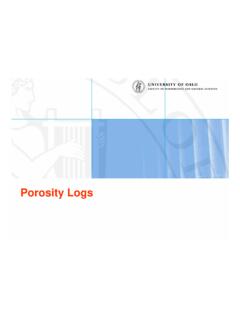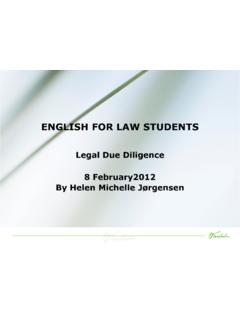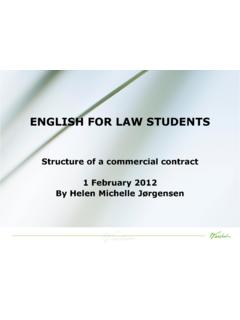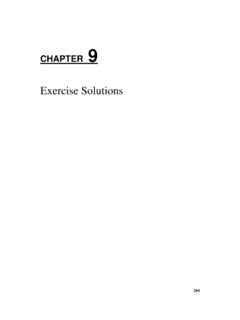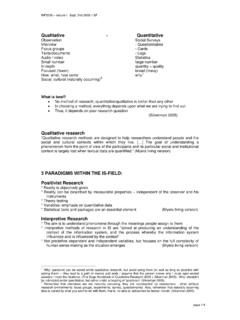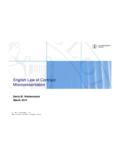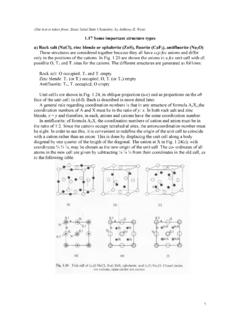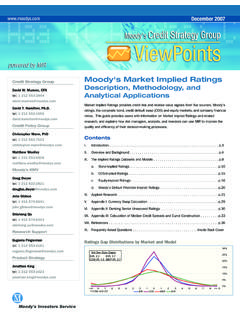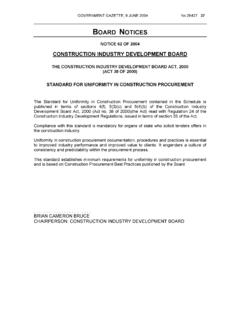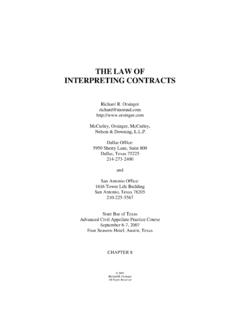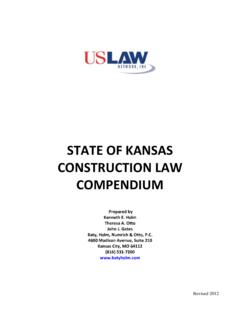Transcription of English Law of Contract: Terms of contract - Forsiden
1 Emily M. Weitzenboeck, 2012 Norwegian Research Center for Computers & LawEnglish Lawof Contract: Terms of contractEmily M. Weitzenb ckMarch 2012 Emily M. Weitzenboeck, 2012 Norwegian Research Center for Computers & LawBasic types of Terms Termsof contract set out duties of each party under that agreement. The Terms will be of two kinds:1) Express Terms : these are laid down by the parties themselves;2) Implied Terms : these are read into the contract by the court on the basis of the nature of the agreement and the parties apparent intentions, or onthe basis of law on certain types of contract . Generally, the Terms of a contract may be either: Wholly oral Wholly written Partly oral and partly written.
2 Terms are to be distinguished from statements made prior to thecontract being made. Two main types of statement: A representation about a state of affairs, or A promise that something will or will not occur in the future. Either type of statement can become a term of the contract , whether or not they are oral or written, or partly oral and partly Terms (1) Oral statements Key issue is whether oral statement made during negotiations prior to conclusion of contract becomes a term of the contract or remains mere representation/promise. This is a question of fact. Courts look at wide range of factors: Importance of statement If statement is so important that a party would not otherwise have entered into the contract , the statement is likely to be viewed as a term, see Bannerman v.
3 White (1861). Timing of statement Generally, the more time between statement and conclusion of contract , the less likely is statement to be held a term of contract . See Routledge v. McKay(1954). Timing factor is point ofdeparture only. If statement is otherwise strong and important thenthis may override significant delay between when it was made and when contract made. See , Schawel v. Reade(1913). Emily M. Weitzenboeck, 2012 Norwegian Research Center for Computers & LawExpress Terms (2) Oral statements (cont.) Strength of statement The more emphatic the statement is, the more likely it is to be viewed as a term. SeeSchawel v. Readeabove. Cf. Ecay v. Godfrey(1947).
4 Special knowledge and skill of parties If statement made by party with special knowledge and expertise onmatter, courts more likely to deem statement a term than ifstatement made by someone without such expertise. See Dick Bentley Productions Ltd. v. Harold Smith (Motors) Ltd. (1965). Cf. Oscar Chess v. Williams(1957). Cf notion of collateral warranty see Poole, pp. 208-209. Emily M. Weitzenboeck, 2012 Norwegian Research Center for Computers & LawExpress Terms (3) Oral statements (cont.) Written contract If contract is put down in writing, any statement appearing in that written agreement will usually be regarded as a term, and any prior oral statement that is not repeated in the written agreement will usually be regarded as a representation, due to the assumption that if a statement is left out of a written agreement, the parties did not view the statement as important.
5 See Routledge v. McKay(above); Duffy & Ors v. Newcastle United Football Co. Ltd.(2000). Signaturewill usually make it difficult for the signatory to successfully argue that the written Terms of the agreementdo not represent what they have agreed: see Estrange v. Graucob Ltd. (1934). Emily M. Weitzenboeck, 2012 Norwegian Research Center for Computers & LawExpress Terms (4) Oral contracts: Incorporation of written Terms Q.: When may written text be regarded as forming part of Terms of an otherwise oral contract ? Incorporation must occurbeforecontract is concluded. See Chapleton v. Barry Urban District Council(1940). Incorporation can take place on basis of signature, reasonable notice, consistent course of dealing, and/or shared understanding of parties.
6 Generally speaking, it is harder to show incorporation the more onerousor unusual is the written clause. See Thornton v. Shoe LaneParking Ltd. (1971). In assessing the extent to which clause is onerous or unusual, one focuseson meaning and effect of the clause in question , not the kind or type of clause: Ocean Chemical Transport Inc. v. Exnor Craggs Ltd. (2000). See further Poole, pp. 219-221. Emily M. Weitzenboeck, 2012 Norwegian Research Center for Computers & LawExpress Terms (5) Interpretation of express Terms When construing meaning of contractual Terms , courts attempt to ascertain the intention of parties on an objective basis. In Investors Compensation Scheme Ltd.
7 V. West BromwichBuilding Society (1998), Lord Hoffmann stated that courts must look for the meaning which the document would convey to a reasonable person having all the background knowledge whichwould reasonably have been available to the parties in thesituation in which they were at the time of the contract . Ongoing debate about the extent to which background knowledge(often termed factual matrix ) is to be taken into account. Traditionally, courts have been reluctant to taken account ofbackground material. Emily M. Weitzenboeck, 2012 Norwegian Research Center for Computers & LawExpress Terms (6) Parol evidence rule Where a contract is reduced to writing, neither party can submitevidence extrinsic to (falling outside) the contractual documentalleging Terms agreed upon but not contained in the document.
8 Of rule in practice: Henderson v. Arthur(1907). Many exceptions to rule, : Intention that agreement be only partially written:Ifwritten document was not intended to set out all of the Terms agreed between the parties, extrinsic evidence of other Terms is admissible. There is tendency nowadays for courts to infer, if possible, such an intention. Rectification: If the document is intended to record previousoral agreement but does not do so accurately, evidenceof oral agreement is admissible. Emily M. Weitzenboeck, 2012 Norwegian Research Center for Computers & LawExpress Terms (7) Parol evidence rule (cont.) Exceptions (cont.): Proof of custom or trade usage:Evidence may be admitted to prove a custom or trade usage that would cast light on how a term in thecontract should be construed.
9 See Smith v. Wilson (1832) . Clarify ambiguity:Extrinsic evidence admissible to clarifyambiguity in express Terms . Show capacity of parties:Extrinsic evidence admissible to show in what capacity the parties were acting when they entered agreement( as principal or agent). Show how contract operates: Parol evidence admissible to show under what circumstance(s) the written contract was intended to commence or cease. See Pym v. Campbell (1856). Support or rebut implied Terms :Parol evidence admissible to support or rebut any Terms implied by law. Emily M. Weitzenboeck, 2012 Norwegian Research Center for Computers & LawExpress Terms (8) Collateral contracts An oral statement can be deemed binding even when it is not a term of a written contract , if it gives rise to a collateral contract .
10 If one party saysthat he will sign the written agreement if he is assured that it is to be construed in a certain way, two contracts may arise: the writtenagreement and a collateral contract based on the oral statement. Classicexposition is the judgment of Lord Moulton in Heilbut Symons & Co. v. Buckleton[1913] AC 30 at 47. Good example of device in operation: City and Westminister PropertiesLtd. v. Mudd (1959). Device of collateral contracts is a way of avoiding parol evidence rule. But device requires provision of consideration, which will usually be entry into main contract . Remember rule on past consideration! Emily M. Weitzenboeck, 2012 Norwegian Research Center for Computers & LawExpress Terms (9) Entire agreement clauses These clauses state that the written contract contains the entireagreement.
